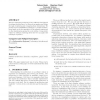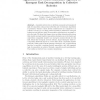254 search results - page 4 / 51 » Risk-Driven Architectural Decomposition |
SOFTVIS
2010
ACM
13 years 5 months ago
2010
ACM
Reverse engineering methods produce different descriptions of software architectures. In this work we analyze and define the task of exploring and comparing these descriptions. ...
IJSEKE
2007
13 years 7 months ago
2007
Software architectural design has an enormous effect on downstream software artifacts. Decomposition of functions for the final system is one of the critical steps in software arch...
PPSN
2004
Springer
14 years 21 days ago
2004
Springer
A scalable architecture to facilitate emergent (self-organized) task decomposition using neural networks and evolutionary algorithms is presented. Various control system architectu...
TPDS
2010
13 years 5 months ago
2010
The objective of this paper is to extend, in the context of multicore architectures, the concepts of tile algorithms [Buttari et al., 2007] for Cholesky, LU, QR factorizations to t...
ICML
1994
IEEE
13 years 11 months ago
1994
IEEE
Compositional Q-Learning (CQ-L) (Singh 1992) is a modular approach to learning to performcomposite tasks made up of several elemental tasks by reinforcement learning. Skills acqui...


